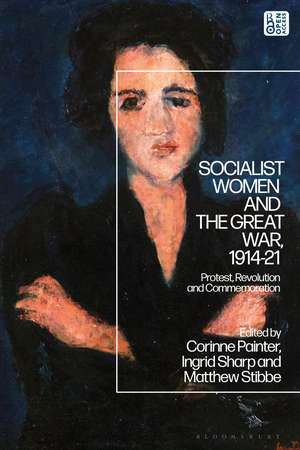Socialist Women and the Great War, 1914-21: Protest, Revolution and Commemoration
Editat de Professor Ingrid Sharp, Professor Matthew Stibbe, Corinne Painteren Limba Engleză Paperback – 26 iun 2024
| Toate formatele și edițiile | Preț | Express |
|---|---|---|
| Paperback (1) | 192.30 lei 6-8 săpt. | |
| Bloomsbury Publishing – 26 iun 2024 | 192.30 lei 6-8 săpt. | |
| Hardback (1) | 511.40 lei 6-8 săpt. | |
| Bloomsbury Publishing – 28 dec 2022 | 511.40 lei 6-8 săpt. |
Preț: 192.30 lei
Preț vechi: 249.87 lei
-23% Nou
Puncte Express: 288
Preț estimativ în valută:
36.80€ • 40.13$ • 31.03£
36.80€ • 40.13$ • 31.03£
Carte tipărită la comandă
Livrare economică 24 aprilie-08 mai
Preluare comenzi: 021 569.72.76
Specificații
ISBN-13: 9781350343504
ISBN-10: 1350343501
Pagini: 272
Ilustrații: 31 bw illus
Dimensiuni: 156 x 234 x 25 mm
Greutate: 0.39 kg
Editura: Bloomsbury Publishing
Colecția Bloomsbury Academic
Locul publicării:London, United Kingdom
ISBN-10: 1350343501
Pagini: 272
Ilustrații: 31 bw illus
Dimensiuni: 156 x 234 x 25 mm
Greutate: 0.39 kg
Editura: Bloomsbury Publishing
Colecția Bloomsbury Academic
Locul publicării:London, United Kingdom
Caracteristici
Brings to the fore the often neglected role of women in left-wing movements and in revolutionary upheavals of early 20th century
Notă biografică
Corinne Painter is Lecturer in German and Intercultural Studies at University of Leeds, UK. She is the author of Writing Lives (2019). Ingrid Sharp is Professor of German Cultural and Gender History at the University of Leeds, UK. She is the editor of Women Activists between War and Peace (2017) and Aftermaths of War (2011), both co-edited with Matthew Stibbe, as well as The Women's Movement in Wartime (co-edited with Alison Fell, 2007).Matthew Stibbe is Professor of Modern European History at Sheffield Hallam University, UK. He is the author of several books, including Germany, 1914-1933: Politics, Society and Culture (2010), and the editor of several volumes of essays on 20th-century European themes, including Women Activists between War and Peace (2017) and Aftermaths of War (2011), both co-edited with Ingrid Sharp.
Cuprins
List of IllustrationsGlossary and List of AbbreviationsNotes on Contributors1. Socialist Women and the Great War, 1914-1921: Protest, Revolution and Commemoration, Matthew Stibbe (Sheffield Hallam University, UK), Ingrid Sharp (University of Leeds, UK), Clotilde Faas (University of Neuchâtel, Switzerland), Veronika Helfert (Central European University, Austria/Hungary), Mary McAuliffe (University College Dublin, Ireland), and Corinne Painter (University of Leeds, UK)2. Socialist Women and 'Urban Space': Protest, Strikes and Anti-Militarism, 1914-1918, Matthew Stibbe (Sheffield Hallam University, UK), Katharina Hermann (University of Bern, Switzerland), Anna Hammerin (Independent Scholar, Sweden/UK) and Ali Ronan (Independent Scholar, UK)3. Socialist Women and Revolutionary Violence, 1918-1921, Veronika Helfert (Central European University, Austria/Hungary), Clotilde Faas (University of Neuchâtel, Switzerland), Tiina Lintunen (University of Turku, Finland) and Mary McAuliffe (University College Dublin, Ireland)4. Suffrage, Democracy and Citizenship, Ingrid Sharp (University of Leeds, UK), Manca G. Renko (University of Ljubljana, Slovenia), Ali Ronan (Independent Scholar, UK) and Judith Szapor (McGill University, Canada)5. Life Trajectories: Making Revolution and Breaking Boundaries, Corinne Painter (University of Leeds, UK), Veronika Helfert (Central European University, Austria/Hungary), Manca G. Renko (University of Ljubljana, Slovenia), and Judith Szapor (McGill University, Canada)6. Commemorating Revolution, Commemorating Women, Mary McAuliffe (University College Dublin, Ireland), Clotilde Faas (University of Neuchâtel, Switzerland), Tiina Lintunen (University of Turku, Finland), Ali Ronan (Independent Scholar, UK) and Ingrid Sharp (University of Leeds, UK)BibliographyIndex
Recenzii
This collection fills significant gaps in our understanding of the ways in which European socialism and revolution developed during and after World War I, adding the important roles played by women as well as gendered analysis of not only their actions but of the larger movements with which they were associated. A welcome contribution!
